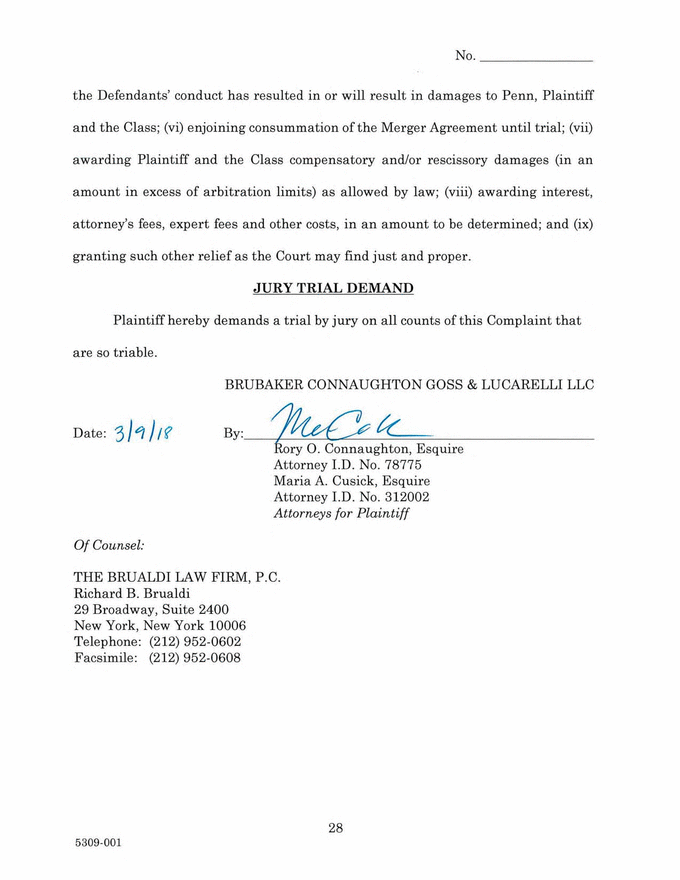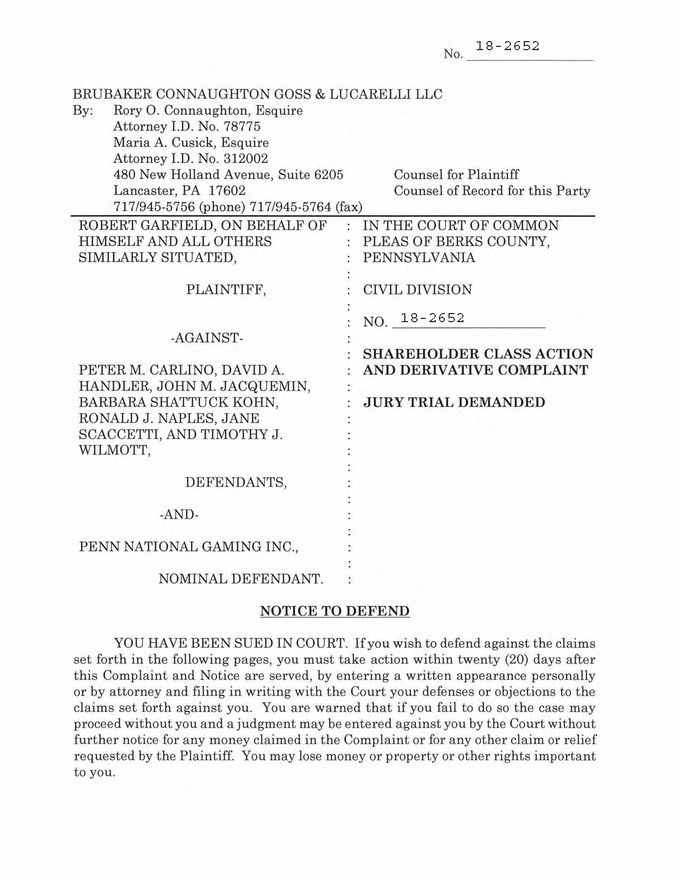Attached files
| file | filename |
|---|---|
| 8-K - 8-K - PENN NATIONAL GAMING INC | a18-7036_48k.htm |
YOU SHOULD TAKE THIS PAPER TO YOUR LAWYER AT ONCE. IF YOU DO NOT HAVE A LAWYER, GO TO OR TELEPHONE THE OFFICE SET FORTH BELOW. THIS OFFICE CAN PROVIDE YOU WITH INFORMATION ABOUT HIRING A LAWYER. IF YOU CANNOT AFFORD TO HIRE A LAWYER, THIS OFFICE MAY BE ABLE TO PROVIDE YOU WITH INFORMATION ABOUT AGENCIES THAT MAY OFFER LEGAL SERVICES TO ELIGIBLE PERSONS AT A REDUCED FEE OR NO FEE. LAWYER REFERRAL SERVICE BERKS COUNTY BAR ASSOCIATION 544 COURT STREET READING, PA 19603 TELEPHONE: (610) 375-4591 BRUBAKER CONNAUGHTON GOSS & LUCARELLI LLC By: RO;y O:COnnaughton, Esquire Attorney I.D. No. 78775 Maria A. Cusick, Esquire Attorney l.D. No. 312002 Attorneys for Plaintiff Of Counsel: THE BRUALDI LAW FIRM, P.C. Richard B. Brualdi 29 Broadway, Suite 2400 New York, New York 10006 Telephone: (212) 952-0602 Facsimile: (212) 952-0608
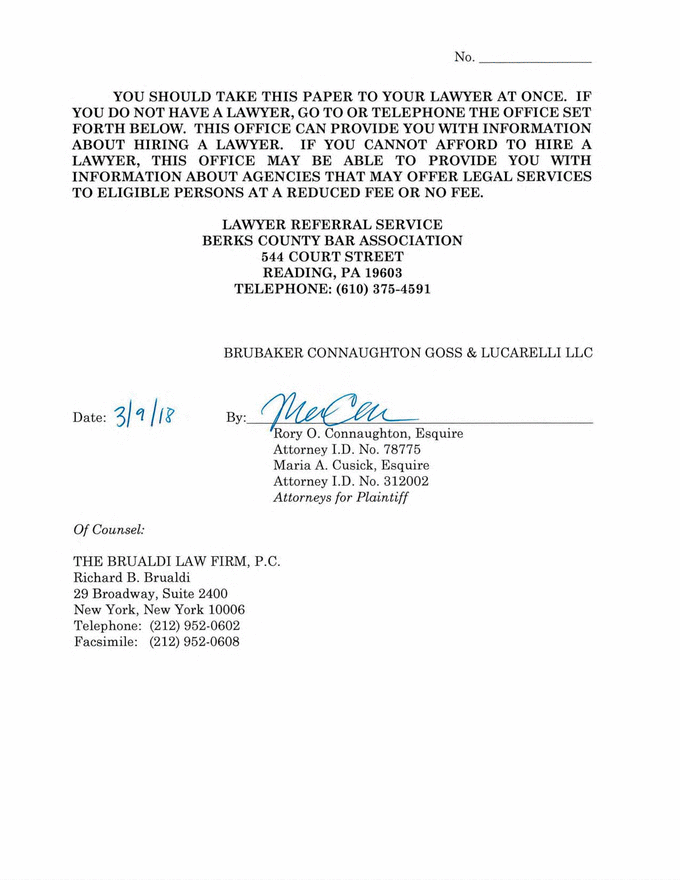
BRUBAKER CONNAUGHTON GOSS & LUCARELLI LLC By: Rory 0. Connaughton, Esquire Attorney I.D. No. 78775 Maria A. Cusick, Esquire Attorney I.D. No. 312002 480 New Holland Avenue, Suite 6205 Lancaster, PA 17602 717/945-5756 (phone) 717/945-5764 (fax) Counsel for Plaintiff Counsel of Record for this Party ROBERT GARFIELD, ON BEHALF OF IN THE COURT OF COMMON HIMSELF AND ALL OTHERS PLEAS OF BERKS COUNTY, SIMILARLY SITUATED, PENNSYLVANIA PLAINTIFF, CIVIL DIVISION -AGAINST-PETERM. CARLINO, DAVID A. HANDLER, JOHN M. JACQUEMIN, BARBARA SHATTUCK KOHN, RONALD J. NAPLES, JANE SCACCETTI, AND TIMOTHY J. WILMOTT, NO. _ SHAREHOLDER CLASS ACTION AND DERIVATIVE COMPLAINT JURY TRIAL DEMANDED DEFENDANTS, -AND-PENN NATIONAL GAMING INC., NOMINAL DEFENDANT. COMPLAINT Plaintiff, by his attorneys, alleges for his Class Action and Derivative Complaint, upon personal knowledge as to himself and his own acts, and upon information and belief as to all other matters, as follows: NATURE OF THE ACTION 1. This is a shareholder class action (the "Action") brought under 5309-001
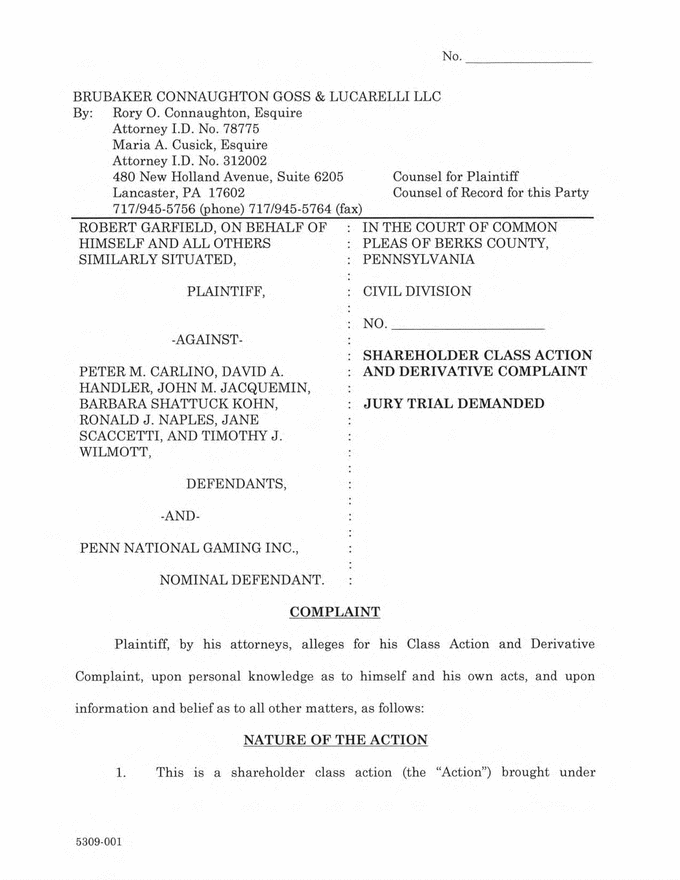
Pennsylvania law by Plaintiff Robert Garfield, a shareholder of Penn National Gaming Inc. ("Penn" or the "Company"), on behalf of himself and other Penn shareholders, against the members of Penn's board of directors (the "Individual Defendants" or the "Boa1·d"). This is also a derivative action brought by Plaintiff on behalf of Defendant Penn against the same Defendants. 2. The Action arises from Defendants' actions in causing Penn to agree to purchase Pinnacle Entertainment, Inc. ("Pinnacle") (the "Merger") pursuant to an agreement entered into on December 17, 2017 (the "Merger Agreement") which benefits Penn's management and its Board, but is to the detriment of Penn, the Plaintiff, and Penn's other public shareholders. Pursuant to the Merger Agreement, Penn will acquire all of the outstanding shares of Pinnacle common stock for $32.47 per share -consisting of the issuance of 0.42 shares of Penn common stock (the "Share Issuance") and $20.00 in cash per share of Pinnace common stock. A copy of The Merger Agreement is attached as Exhibit A and incorporated by reference. Plaintiff challenges the Merger and the related issuance of additional Penn shares to finance the Merger because each is the product of, or tainted by fraud or fundamental unfairness. 3. As alleged herein, the Merger was not in the best interests of Penn shareholders because: Penn is paying a 113% premium for Pinnacle, overpaying by over $1.58 billion; The premium is in excess of the synergy value projected by Defendants to accrue to Penn shareholders from the Merger meaning that Penn is overpaying for Pinnacle, even assuming the accuracy of the Individual Defendants' 2 5309·001
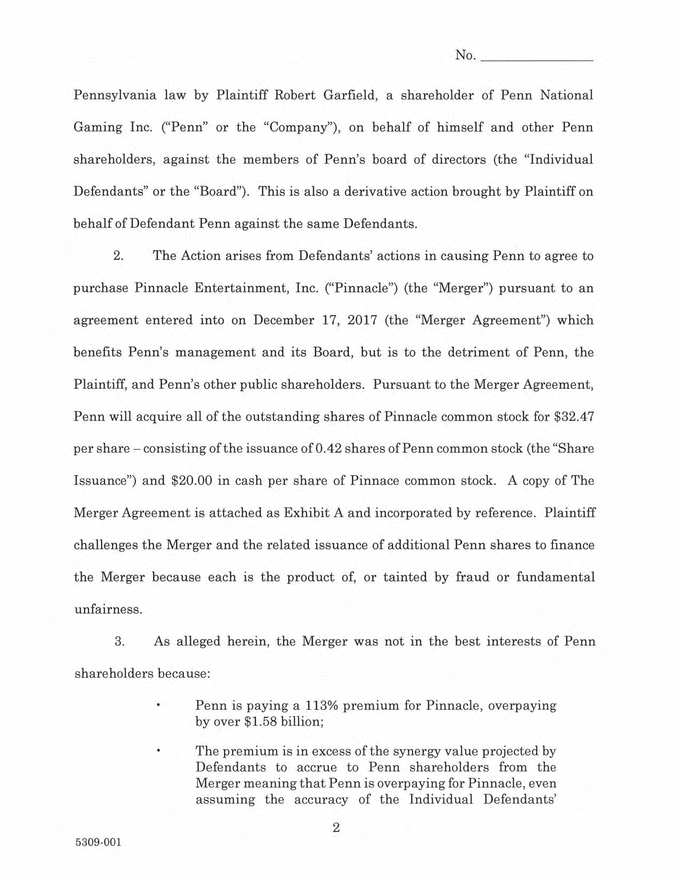
synergy valuation; Penn is also anticipated to take on approximately $4.2 billion in debt plus financing obligations in connection with the Merger; The post-merger company will be significantly leveraged, at a time where interest rates ru.·e rising and the economy could potentially be on the cusp of a recession; Penn has arranged for approximately $1.98 billion of the debt needed to finance the Me1·ger through Goldman Sachs & Co. LLC ("Goldman Sachs"), the same firm it selected to render a purportedly unbiased opinion regarding the fairness of the Merger to Penn shareholders, and others; •To partially finance the Merger, in addition to the debt financing described herein, the Defendants a1·e causing Penn to divest itself of valuable assets for $575 million in cash, then entering into agreements to lease such assets back for $315 million. Goldman Sachs is not unbiased, however, because most of its compensation ---over $22.5 million ---is contingent on the consummation of the Merger (and it is expected to earn as much as $7.1million for the provision of financing), and The issuance of new shares of Penn's stock to Pinnacle's shareholders will substantially dilute current Penn shareholders voting rights a nd ownership, by reducing such ownership and voting rights fi·om 100% to 78%. 4. As Plaintiff further alleges below, Penn's directors were motivated to cause Penn to enter into the Merger Agreement by their own self-interest. In this regru.·d, the compensation of Penn's other board members, which is extremely excessive ---over $300,000 per year on average ---for what is at most a part time job, is determined by, among other things, reference to the size of the compensation of directors of similarly sized "peer companies." For this reason, each of Penn's board
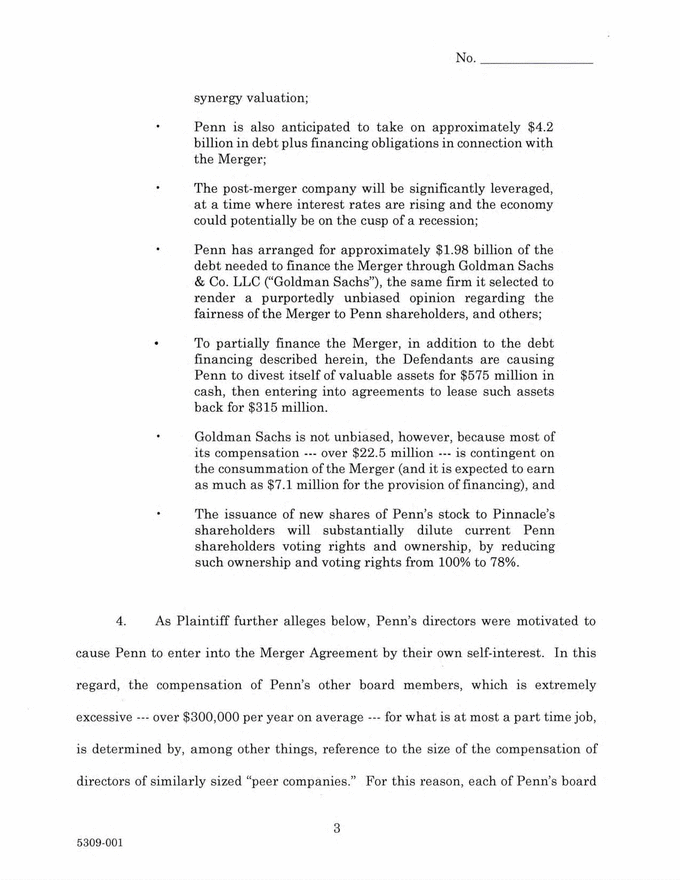
members will personally benefit from the Merger Agreement because an increase in Penn's size will place Penn and its directors in a higher paying peer group. 5. In order to persuade Penn's shareholders to approve such an unfavorable merger and the highly dilutive Share Issuance, the Individual Defendants disseminated a prospectus which concealed the conflicts of interest of Defendants' purported independent financial advisor, Goldman Sachs, so as not to discredit its recommendation of the Merger to Penn's shareholders. While the Registration Statement touts Goldman Sachs' opinion that the price Penn is paying for Pinnacle is "fair," it does not disclose that Goldman Sachs is itself a Pinnacle shareholder, holding over $10 million worth of Pinnacle stock (more than double the amount of Pinnacle stock it held when it started advising Pinnacle on the Merger). To the contrary, the Prospectus does not even acknowledge that Goldman Sachs is a Pinnacle shareholder. Rather, it misleadingly states that Goldman Sachs "may" (or may not) own Pinnacle shares. A copy of the Prospectus is attached hereto as Annex A to Exhibit A and incorporated by reference. JURISDICTION 6. This Court has jurisdiction over this action because it is the Court of general jurisdiction for Berks County where Penn is headquartered. Moreover, as alleged in more detail infra, this Court has jurisdiction over each of the Defendants pursuant to 42 Pa.C.S. § § 5301 and 5322(a)(7)(iv) because they serve as directors and/or officers of a corporation incorporated under the laws of Pennsylvania, conduct business in, reside in, are citizens of, or directed their wrongful conduct at,
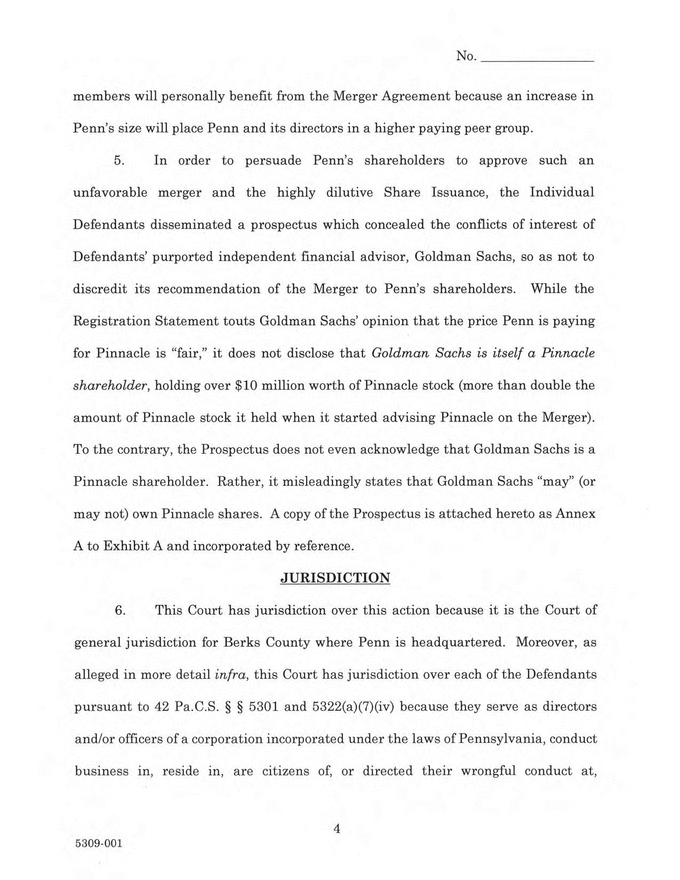
Pennsylvania. 7. Venue is proper in this Court pursuant to Pa. R.C.P. Rule 2179(a)(1) because Penn's principal place of business in Pennsylvania is located in Berks County at 825 Berkshire Boulevard, Suite 200, Wyomissing, PA 19610. 8. This Action challenges the internal affairs or governance of Penn under Pennsylvania law and hence is not removable to Federal Court under the Class Action Fairness Act of 2005 or the Securities Litigation Uniform Standards Act ("SLUSA"), 15 U.S.C. § 78bb(f). PARTIES 9. Plaintiff Robert Garfield is a native of Pennsylvania who lived here (except for the years 1962 to 1969 when he was in the Air Force) his entire life, until he semi-retired and moved to Florida several years ago. Plaintiff Garfield gTaduated from Grove City College, where he received a Bachelor of Science Degree. Plaintiff Garfield now spends a portion of his retiTement time managing his retirement portfolio, including an investment in Penn. Plaintiff Garfield has continuously owned Penn common stock since on or about October 12, 2015. 10. Nominal Defendant Penn is a Pennsylvania corporation with its registered address located in Berks County at 825 Berkshire Boulevard, Suite 200, Wyomissing, PA 19610. Penn is a multi-jurisdictional owner and manager of gaming and racing facilities and video gaming terminal operations with a focus on slot machine entertainment. Penn's common stock is listed on the NASDAQ under the symbol "Penn." This Court has juTisdiction over Penn because Penn is incorporated
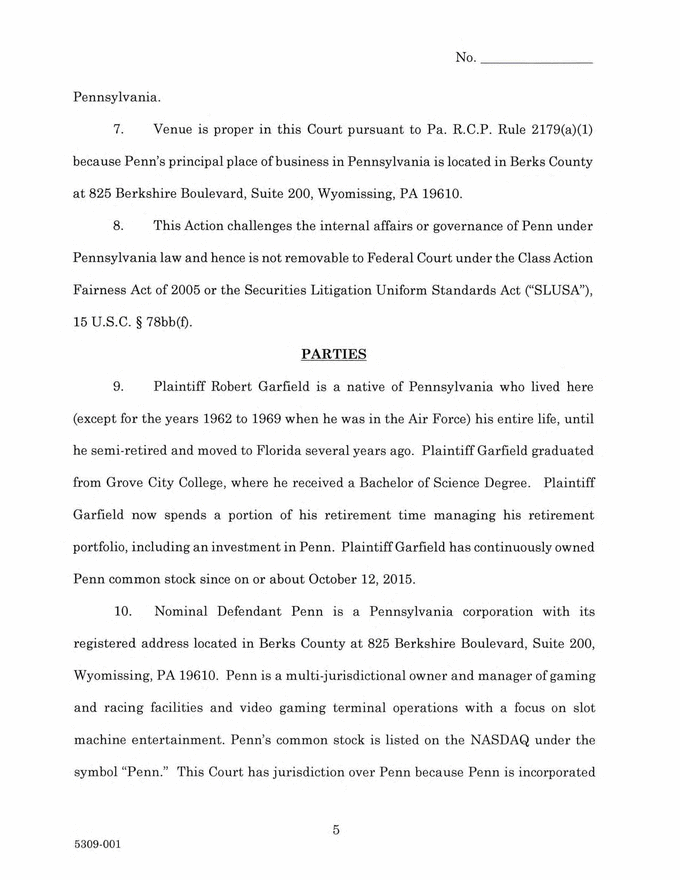
under the laws of, and headquartered in, this Commonwealth. 11. Defendant Timothy J. Wilmott ("Mr. Wilmott" or "CEO Wilmott") has served as a director of Penn since 2014. He also serves as Chief Executive Officer ("CEO") of Penn since 2013 and as Chief Operating Officer ("COO") since 2008. Further, CEO Wilmott also served as President of Penn from February 2008 to March 2017. In 2016, Mr. Wilmott received total compensation valued at $6,163,317.00 for serving as a Penn executive which amount was derived in part from reference to the compensation of CEOs of similarly sized corporations. This Court has jurisdiction over Mr. Wilmott because Penn is headquartered in this Commonwealth and because his improper conduct alleged in this Complaint occurred in substantial part, was directed at, and/or intended to have its primary effect in, this Commonwealth. 12. Defendant Peter M. Carlino ("Mr. Carlino" or "Chairman Carlino") has served as Penn's Chairman of the Board since April 1994 and served as the Company's CEO from 1994 to 2013. In 2016, Chairman Carlino received total compensation valued at $425,006.00 for serving as a Penn director and Chairman of the Board. The amount of Mr. Carlino's compensation was determined and/or justified in part by reference to the compensation of directors of similarly sized corporations. Nonetheless, compensation of this magnitude solely for serving as a part-time board member is neither usual nor customary. This Court has jurisdiction over Mr. Carlino because Penn is headquartered in this Commonwealth and because his improper conduct alleged in this Complaint occurred in substantial part, was directed at, and/or intended to have its primary effect in, this Commonwealth.
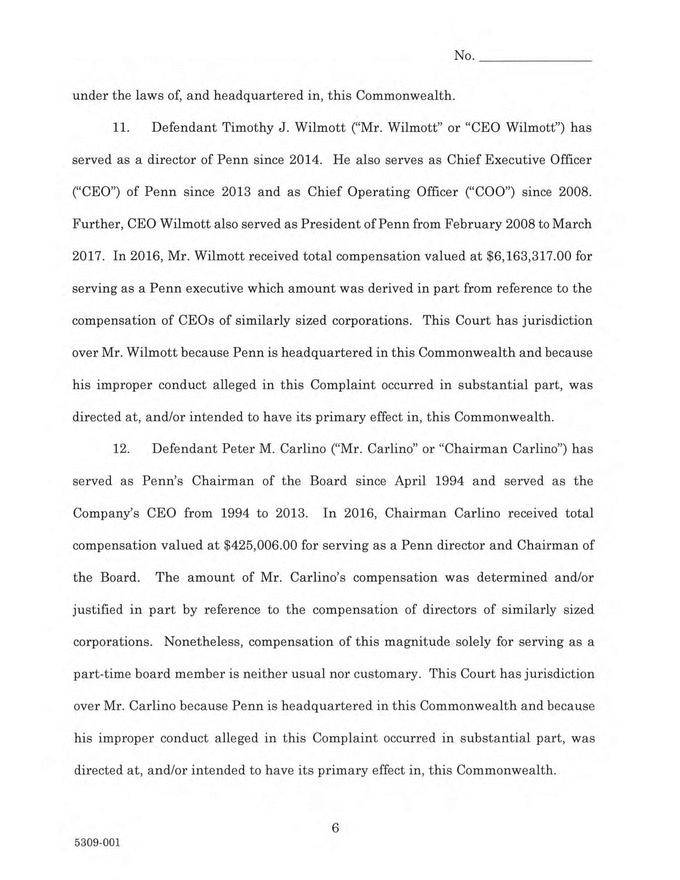
13. Defendant David A. Handler ("Mr. Handler") has served as a director of Penn smce 1994. In 2016, Mr. Handler received total compensation valued at $310,000.00 for his part-time service as a Penn director. The amount of Mr. Handler's compensation was determined and/or justified in pal't by refeTence to the compensation of diTectoTs of similarly sized corpoTations. Nonetheless, compensation of this magnitude solely foT serving as a paTt-time boat·d membeT is neitheT usual noT customary. This Court has jurisdiction oveT Mr. Handle!' because Penn is headquartered in this Commonwealth and because his improper conduct alleged in this Complaint occurTed in substantial part, was diTected at, andloT intended to have its primary effect in, this Commonwealth. 14. Defendant John M. Jacquemin ("Mr. Jacquemin") has seTved as a director of Penn since 1995. In 2016, Mr. Jacquemin received total compensation valued at $310,000.00 for his part-time service as a Penn director. The amount of Mr. Jacquemin's compensation was determined and/or justified in part by reference to the compensation of directors of similarly sized corporations. Nonetheless, compensation of this magnitude solely for serving as a part-time board member is neither usual nor customary. This Court has jurisdiction over Mr. Jacquemin because Penn is headquartered in this Commonwealth and because his improper conduct alleged in this Complaint occurred in substantial part, was directed at, and/or intended to have its primary effect in, this Commonwealth. 15. Defendant Barbara Shattuck Kohn ("Ms. Kohn") has served as a director of Penn since 2004. In 2016, Ms. Kohn received total compensation valued at
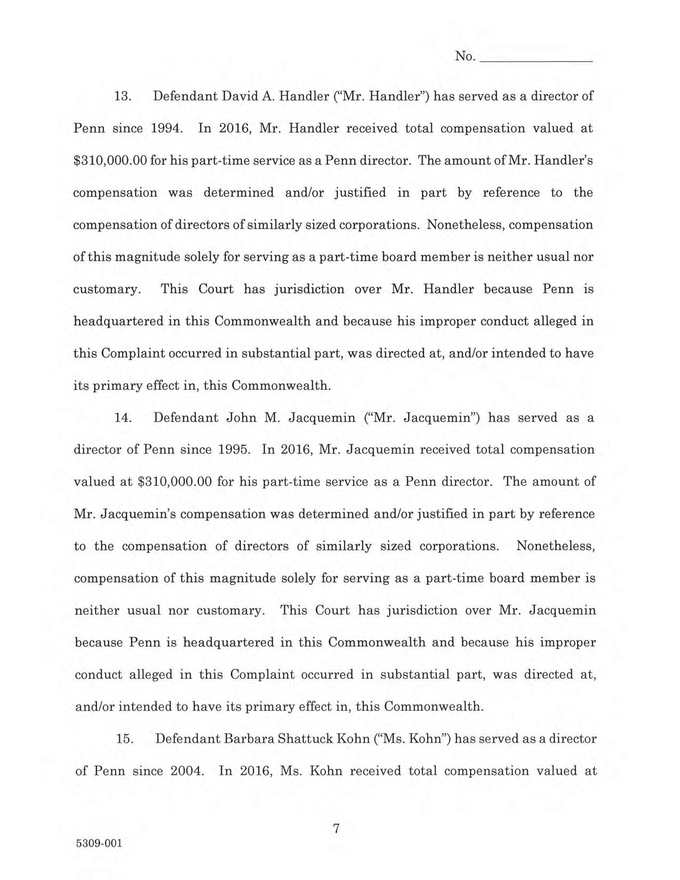
$320,000.00 for her part-time service as a Penn director. The amount of Ms. Kohn's compensation was determined and/or justified in part by reference to the compensation of directors of similarly sized corporations. Nonetheless, compensation of this magnitude solely for serving as a part-time board member is neither usual nor customary. This Court has jurisdiction over Ms. Kohn because Penn is headquartered in this Commonwealth and because her improper conduct alleged in this Complaint occurred in substantial part, was directed at, and/or intended to have its primary effect in, this Commonwealth. 16. Defendant Ronald J. Naples ("Mr. Naples") has served as a director of Penn since June 2013. In 2016, Mr. Naples received total compensation valued at $310,000.00 for his part-time service as a Penn director. The amount of Mr. Naples' compensation was determined and/or justified in pa1·t by refe1·ence to the compensation of directors of similarly sized corporations. Nonetheless, compensation of this magnitude solely for serving as a part-time board member is neither usual nor customary. This Court has jurisdiction over Mr. Naples because Penn is headquartered in this Commonwealth and because his improper conduct alleged in this Complaint occurred in substantial part, was directed at, and/or intended to have its primary effect in, this Commonwealth. 17.Defendant Jane Scaccetti ("Ms. Scaccetti") has served as a director of Penn s1nce 2015. In 2016, Ms. Scaccetti received total compensation valued at $310,000.00 for her part-time service as a Penn director. The amount of Ms. Scaccetti's compensation was determined and/or justified in part by reference to the
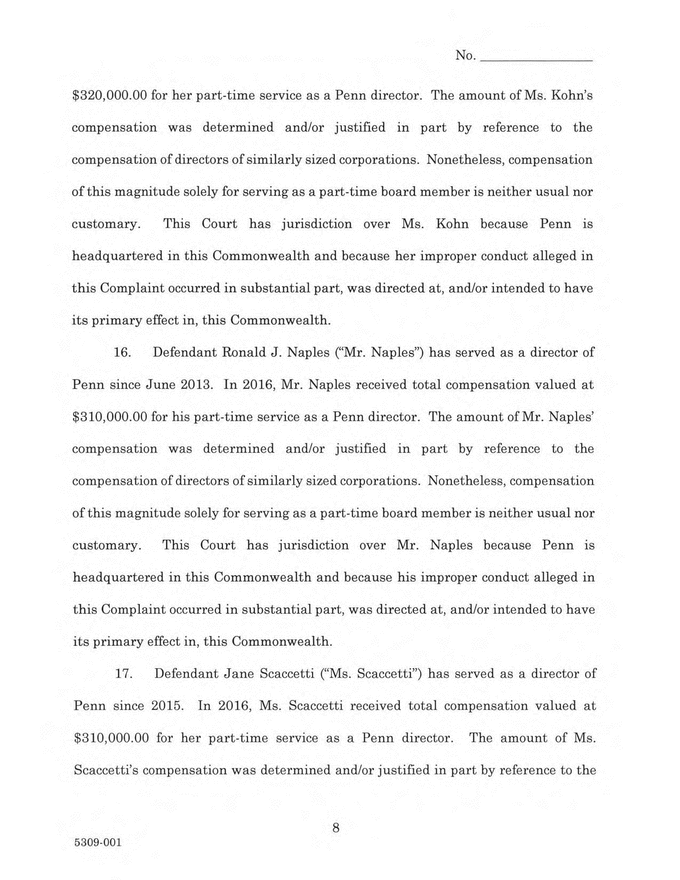
compensation of directors of similarly sized corporations. Nonetheless, compensation of this magnitude solely for serving as a part-time board member is neither usual nor customa1·y. This Court has jurisdiction over Ms. Scaccetti because Penn is headquartered in this Commonwealth and because her improper conduct alleged in this Complaint occurred in substantial part, was directed at, and/or intended to have its primary effect in, this Commonwealth. DERIVATIVE AND CLASS ACTION ALLEGATIONS 18. Plaintiff brings this Action as a derivative action on behalf of and for the benefit of Penn pursuant to Pa. R.C.P. Rule 1506. 19. On February 28, 2017 Defendants mailed the prospectus which revealed the true extent of their wrongdoing. Thereafter, three business days later on March 5, 2018, Plaintiff made a demand upon Penn's Board, demanding that the Individual Defendants institute a lawsuit asserting the claims alleged herein on behalf of Penn against the Defendants (the "Demand Letter"). The Board has yet to take appropriate legal action against the Company's directors and any other individuals responsible for causing the substantial harm to Penn as described herein. Further, the Defendants have scheduled the consummation of a shareholdr vote on the Share Issuance for March 29, 2018. In light of the eminent harm that will ensure if the vote is consummated, Plaintiff commences this action. 20. Plaintiff also brings this Action as a class action pm·suant to Pa. R.C.P. 1702 et seq. on behalf of himself and all public common stock holders of the Company. Excluded from the Class are (1) Defendants, members of the immediate families of
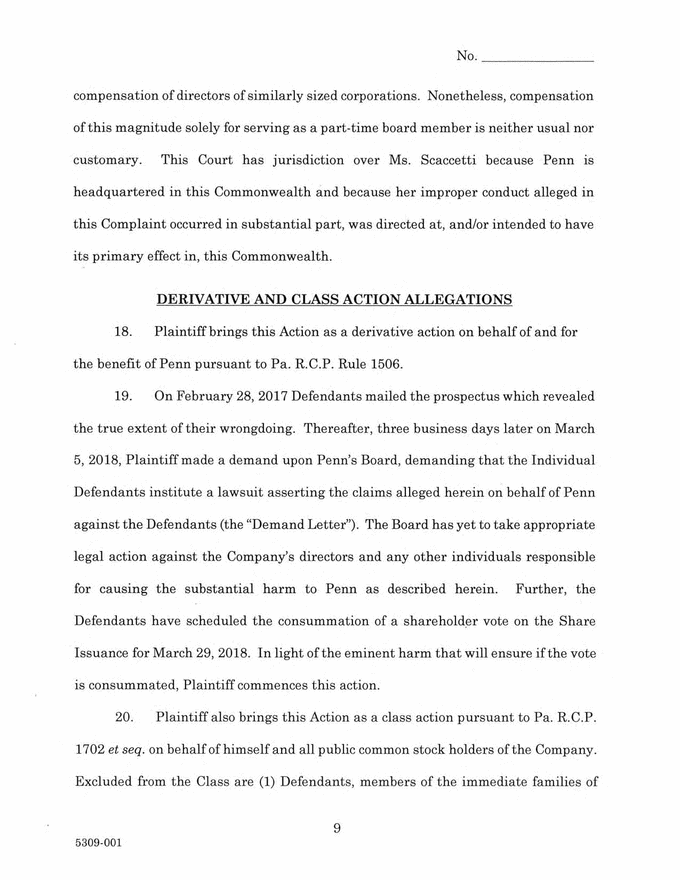
the Defendants, their heirs and assigns, and those in privity with them, (2) holders of 5% or more, in the aggregate, of Penn's stock and their Related Persons (as defined by SEC rules), and (3) Sean Griffith and any other shareholder who purchased his, her or its shares solely for the purpose of objecting to any potential settlement of this action. 21. The members of the Class are so numerous that joinder of all of them would be impracticable. As of March 1, 2018, the Company had approximately 91 million shares of common stock outstanding held by 433 holders of record, and thousands of beneficial owners. 22. There are questions oflaw and fact common to the members of the Class, including whether: (a) the Individual Defendants engaged in self-dealing in connection with the Merger; (b) the Individual Defendants were motivated by self-dealing to enhance their personal compensation; (c)the Prospectus is false, misleading and incomplete; (d) Defendants misrepresented their financial advisor's conflicts of interest; (e) the Merger is the product of, or tainted by, fraud or fundamental unfaiJ:ness; (f) the Individual Defendants are unjustly enriching themselves at the expense of Plaintiff and the Class;
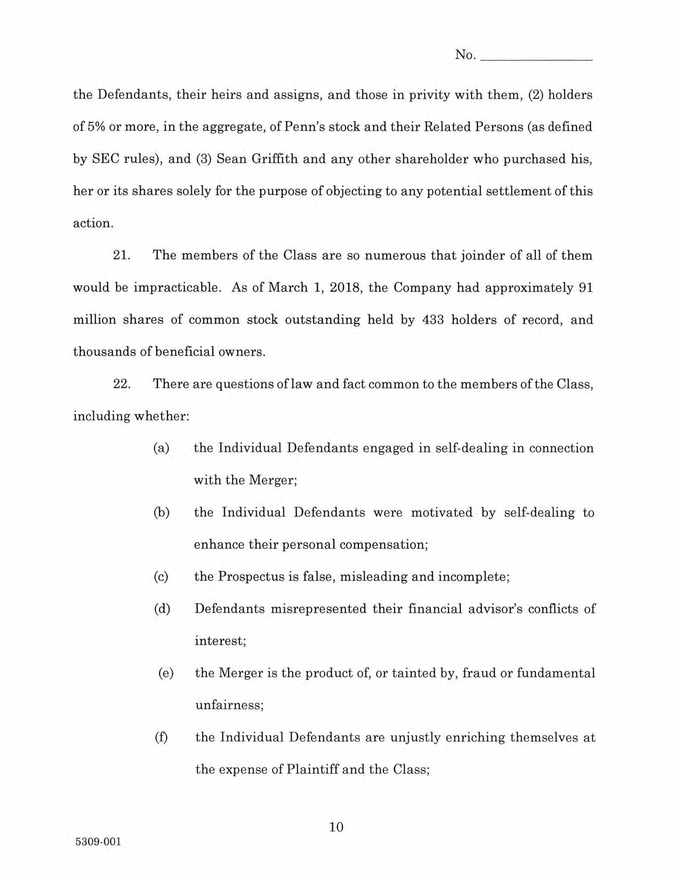
(g) the Individual Defendants wrongfully and for improper motives impeded the procurement of an accurate and unbiased fai1·ness opinion rega1·ding the consideration being paid to Pinnacle's shareholders; (h) the consideration being paid to Pinnacle's shareholders is unfair; (i)the Individual Defendants are unfairly diluting the shareholdings of Plaintiff and the Class; G) the Share Issuance and Merger are unfau·, inadequate, unreasonable, and/or not in the best interests of Plaintiff and the Class; (k) Defendants abridged the right of Plaintiff and the Class to vote on the Share Issuance an informed basis; (l) Plaintiff and the Class have been damaged and the proper measure of damages; (m) whether, and the amount by which, the Individual Defendants have been unjustly enriched. 23. Plaintiff will fairly and adequately assert and protect the interests of the Class under the criteria set forth in Pa. R.C.P. 1709. Plaintiff is committed to the vigorous prosecution of this action and has retained counsel competent and experienced in this type of litigation. Plaintiffs counsel is experienced in this type of litigation and will adequately represent the interests of the Class. Plaintiff does not have any conflicts of interest in the maintenance of the class action. Plaintiff has or
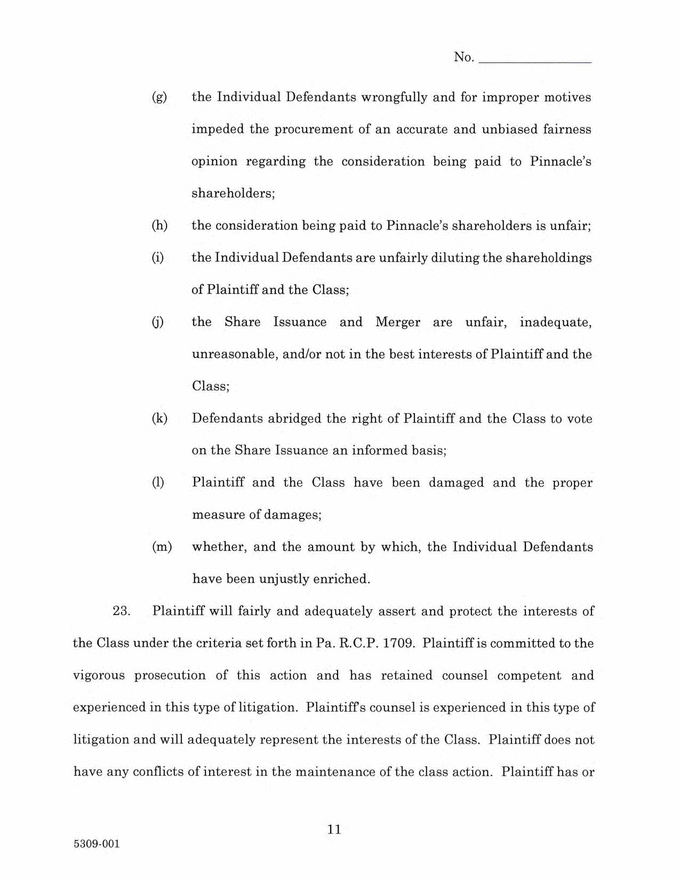
can acquire adequate financial resources to assure that the interests of the Class will not be harmed. 24. A class action provides a fair and efficient method for adjudication of this controversy under the criteria set forth in Pa. R.C.P. 1708. Common questions of law or fact predominate over any question affecting only individual members. Plaintiff anticipates no difficulty in the management of the action as a class action. Further, the prosecution of sepa1·ate actions by or against individual members of the class would create a risk of (i) inconsistent or varying adjudications with respect to individual members of the Class which would confront the party opposing the class with incompatible standards of conduct, and (ii) adjudications with respect to individual members of the class which would as a practical matter be dispositive of the interests of other members not parties to the adjudications or substantially impair or impede their ability to protect their interests. 25. This Court is appropriate for the litigation of the claims of the entire Class since Penn is incorporated in Pennsylvania and Penn's registered business address is located in Berks County. 26. The parties opposing the Class have acted or refused to act on grou nds generally applicable to the Class, thereby making final equitable or declaratory relief appropriate with respect to the Class. SUBSTANTIVE ALLEGATIONS A. Penn's Directors Caused Penn to Agree to Merge with Pinnacle to Serve Their Own Benefits to the Detriment of the Company's Public Shareholders
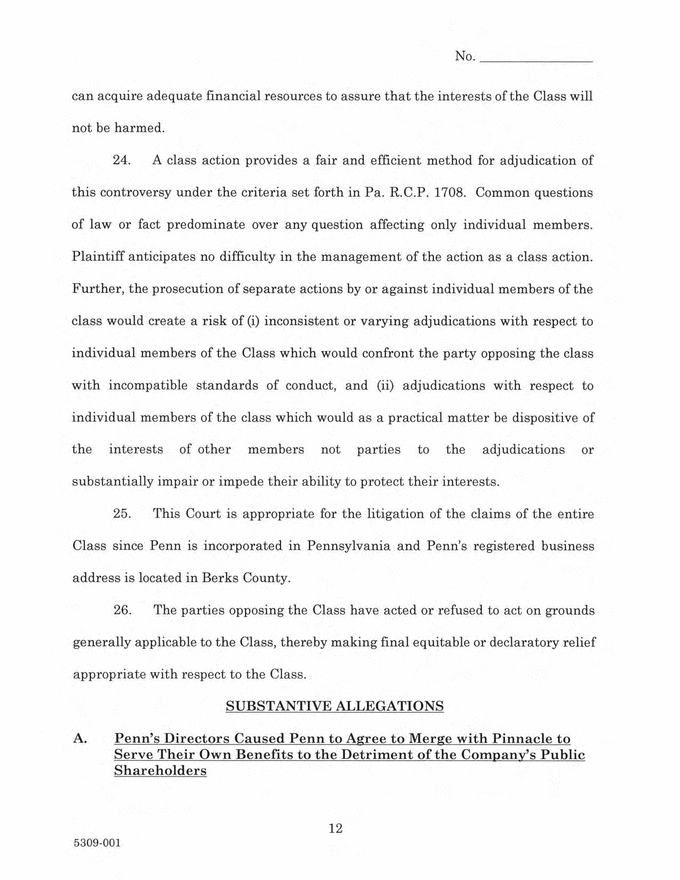
27. On December 18, 2017, the Individual Defendants caused Penn to announce that it and Pinnacle had entered into the Merger Agreement under which Penn will acquire all of the outstanding shares of Pinnacle common stock for approximately $32.47 per share - consisting of $20.00 in cash and 0.42 of a share of Penn common stock per share of Pinnacle common stock. In connection with the Merger, Penn is also anticipated to take on approximately $4.2 billion in debt plus financing obligations. Upon consummation of the Merger, the combined company will become a significantly larger company, and the Individual Defendants will be able to justify increasing their already excessive compensation. 28. As further alleged herein, Penn's directors were motivated to cause Penn to enter into the Merger Agreement by their own self-interest in increasing their personal compensation. In this regard, the compensation of both CEO Wilmott as well as the other members of the Board is set through comparison to the compensation of the CEO's and board members of peer companies. Thus, as Penn grows, so too does the compensation of Mr. Wilmott and the members of its Board. Here, the Merger significantly increases Penn in size, thus leading to a concomitant increase in compensation for CEO Wilmott and the other members of the Board. As one article has noted: It is well-known that one of the variables most highly correlated with ... compensation is the size of the company. It doesn't matter whether company size is measured as assets, ma1·ket value, sales revenue or number of employees -bigger firms pay more ... way more. 29. In his recent letter to shareholders to Berkshire Hathaway, Warren Buffet concurred, noting as follows:
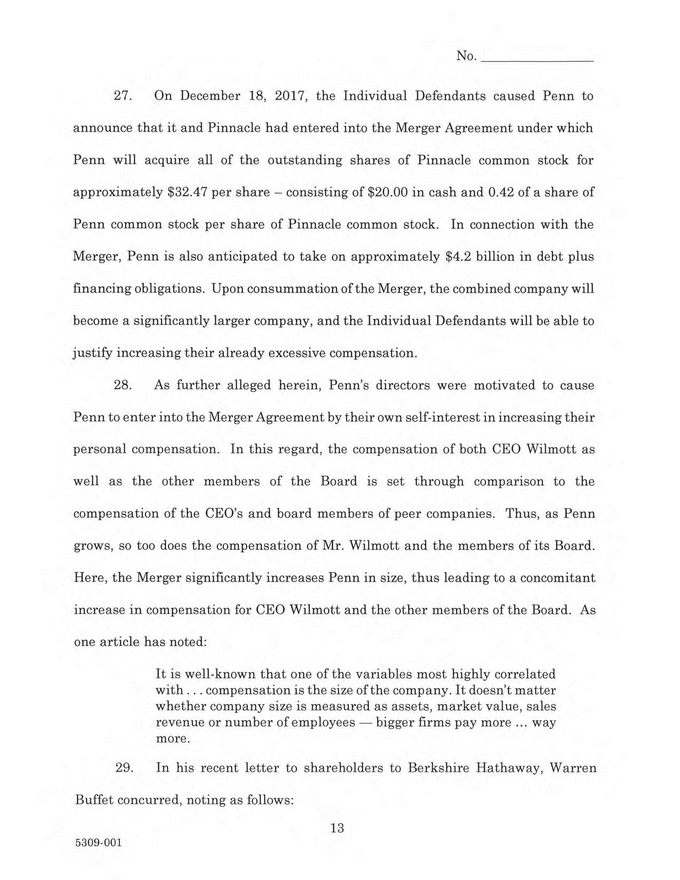
Once a CEO hungers for a deal, he or she will never lack for forecasts that justify the purchase. Subordinates will be cheering, envisioning enlarged domains and the compensation levels that typically increase with cor porate size. Investment bankers, smelling huge fees, will be applauding as well. (Don't ask the barber whether you need a haircut.) If the historical performance of the target falls short of validating its acquisition, large "synergies" will be forecast. Spreadsheets never disappoint. Warren Buffett, Letter to Berkshire Hathaway Shareholders, BERKSHIRE HATHAWAY (February 24, 2018) http://www.berkshirehathaway.com/letters/2017ltr.pdf. 30. Thus, the Individual Defendants have a strong personal financial incentive to pursue the Merger, no matter the cost to Penn shareholders or unprofitability, in order to achieve their increased compensation and status in the industry. 31. In 2016, DefendantWilmott received total compensationof $6,163,317.00 for serving as Penn's CEO, which was determined and/or justified in part by reference to the compensation of CEOs of similarly sized corporations. 32. In 2016, Defendant Carlino received total compensation of $425,006.00 for part time service as a Penn director and chairman of the boa1·d, which was determined and/or justified in part by reference to the compensation of directors of similarly sized corporations, for serving as a part-time board member of Penn. 33. In 2016, Defendant Handler received total compensation of $310,000.00, which was determined and/or justified in part by reference to the compensation of directors of similarly sized corporations, for serving as a pru·t-time board member of Penn. 34. In 2016,DefendantJacquemin received total compensationof $310,000.00, which was determined and/or justified in part by reference to the
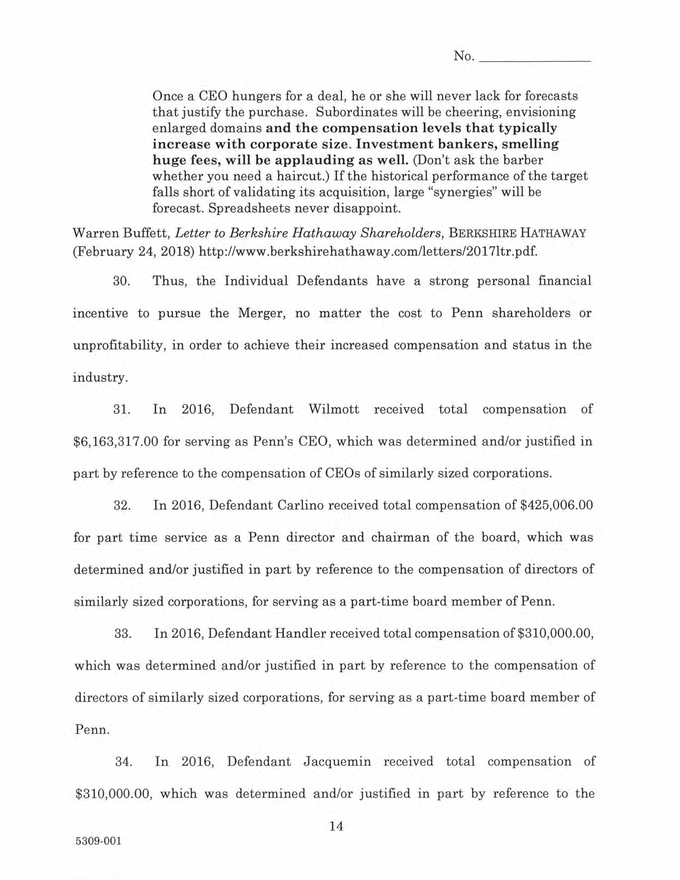
compensation of directors of similarly sized corporations, for serving as a part-time board member of Penn. 35. In 2016, Defendant Kohn received total compensation of $320,000.00, which was determined and/or justified in part by reference to the compensation of directors of similarly sized corporations, for serving as a part-time board member of Penn. 36. In 2016, Defendant Naples received total compensation of $310,000.00, which was determined and/or justified in part by reference to the compensation of directors of similarly sized corporations, for serving as a part-time board member of Penn. 37. In 2016, DefendantScaccetti received total compensationof $310,000.00, which was determined and/or justified in part by reference to the compensation of directors of similarly sized corporations, for serving as a part-time board member of Penn. B. The Individual Defendants are Causing Penn To Grossly Overpay For Pinnacle 38. While the Pinnacle acquisition personally benefits the Individual Defendants, the acquisition is to the detriment of Penn shareholders because the Individual Defendants are causing Penn to grossly overpay fm· Pinnacle. In this regard, as the below graph demonstrates, in the five years prior to September 2017, Pinnacle's stock regularly traded below $20 per share. Indeed, in the yeru: prior to September 2017, at a time when the stock market was booming, it traded at an
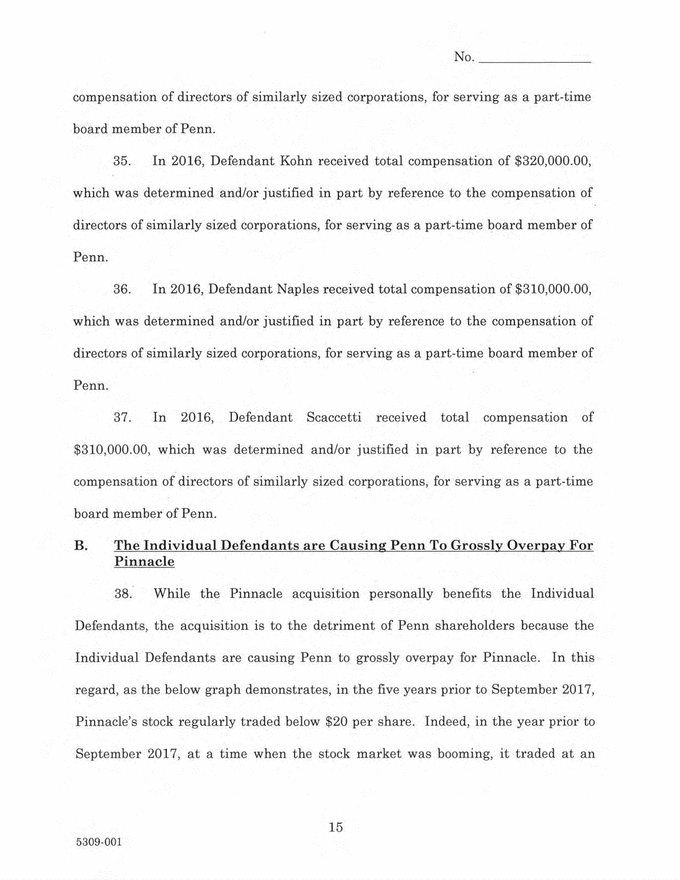
average pnce of $15.24 per share.1 Thus, by paying approximately $32.47 per Pinnacle share, Penn is significantly overpaying for Penn by approximately $1.58 billion. Zoom:1weekI monthYfD1year3 yea1-sSyeusCustom Table View 30 25 20 15 1 0 .Events OS/ 1 /16 09/ 1 /]6 01/1/17 05/1/17 09/ 1 /1701/1/18 C. The Merger Is Highly Dilutive of Penn's Shareholders' Voting Rights and Ownership Interests 1 The bump in Pinnacle's stock price in September 2017 appear to be the result of the news that Pinnacle's CEO and Chairman, Anthony Michael Sanfillipo, had purchased over 21,000 shru·es of Pinnacle's stock. The upward trajectory of Pinnacle's share price continued into the fall of 2017 as speculation regarding a potential merger with Penn permeated the market.
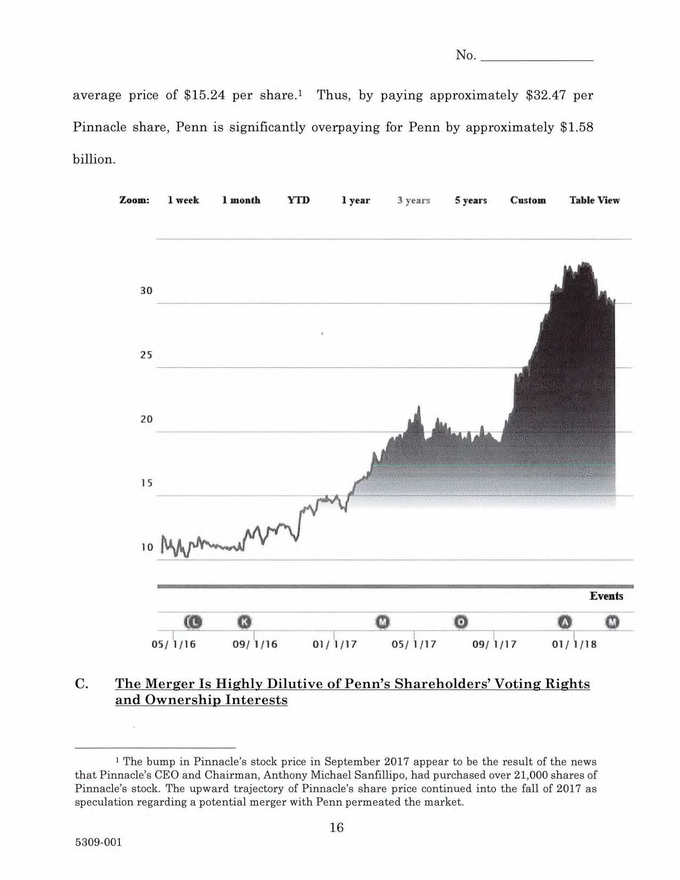
39. Additionally, Penn shareholders will have had their ownership percentage of the Company significantly diluted without receiving appropriate consideration. Specifically, following consummation of the Merger Agreement, current Penn shareholders will only own approximately 78% of the surviVIng company. As a result of the Pinnacle acquisition, Penn shareholdeTs will have substantially less influence and control on the management and policies of Penn. D. The Merger-Related Debt Load Will Cause Penn to Become Overleveraged and Limit its Business Opportunities 40. Moreover, the Merger will restrict the Company's ability to pursue future growth by incTeasing Penn's leverage. In this regard, Penn is already a highly leveraged company. Despite Penn's market capitalization of $2.62 billion, it has over $4.87 billion in debt, $1.33 billion in unprotected borrowings and credit facilities, and $3.46 billion in triple-net lease obligations to Gaming and Leisure Properties, Inc. ("GLPI''). Further compounding the strain on the Company is that, of the Company's current debt, $1.55 billion is due within the next 24-months, and the only way it can pay off this debt is by rolling it over at a time when interest rates are rapidly increasing. Moreover, Penn is anticipated to take on approximately $4.2 billion in debt plus financing obligations. 41. Additionally, to partially finance the Merger, in addition to the debt financing described herein, the Defendants are causing Penn to divest itself of valuable assets for $575 million in cash, then entering into agreements to lease such assets back for $315 million.
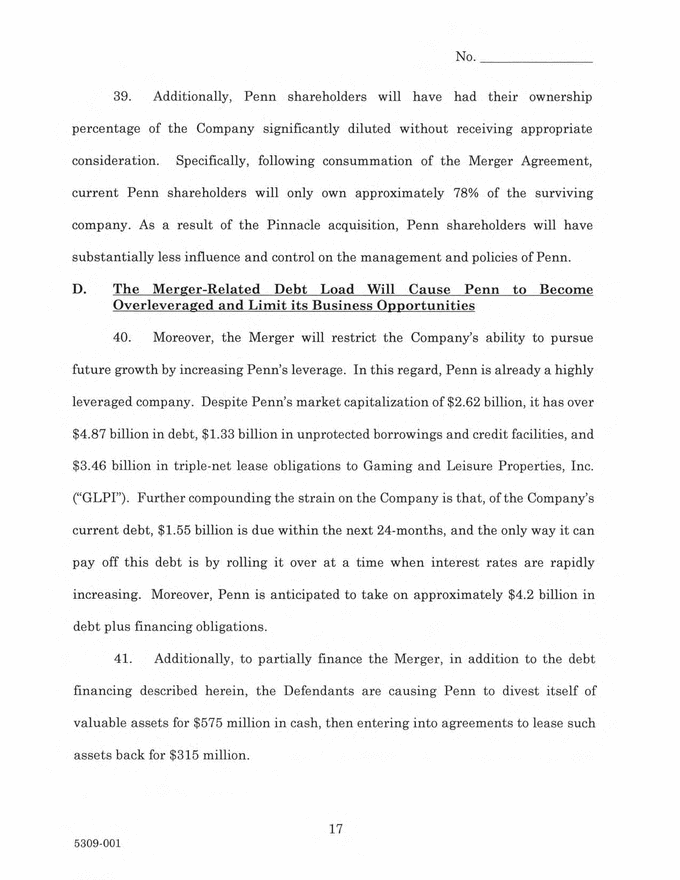
42. As a result, Penn's significant debt and depletion of valuable assets place the Company and its public shareholders in a very vulnerable position, making it susceptible to the ravages of an economic or industry downturn, constraining its ability to grow and take advantage of strategic business opportunities, and placing the Company at a disadvantage to its competitors that are less debt ridden and less leveraged. E. Penn Shareholders Were Not Provided with Unbiased Investment Banking Advice 43. The Individual Defendants determined to (and did) ensure that investment banks with significant self-interest in the Merger were hired to opine that the consideration payable pursuant to the Merger was fair to Penn and its shareholders from a financial point of view. 44. In connection with the Merger, Penn agreed to pay Goldman Sachs $22.5 million if the Merger is consummated (in addition to fees of up to $7.1 million for providing financing for the Merger), but only $1.5 million if it is not. Consequently, in order for Goldman Sachs to receive over 90% of its $22.5 million, it had to produce a favorable fairness opinion for the Penn board to tout to their public shareholders and solicit votes in favor of the merger. Goldman Sachs is conflicted by this payment structure rendering its fairness opinion unbalanced and unsuitable for reliance by Penn's public shareholders. 45. Further, the Individual Defendants caused Penn to hire Goldman Sachs to opine on the fairness of the consideration that Penn was proposing to pay for
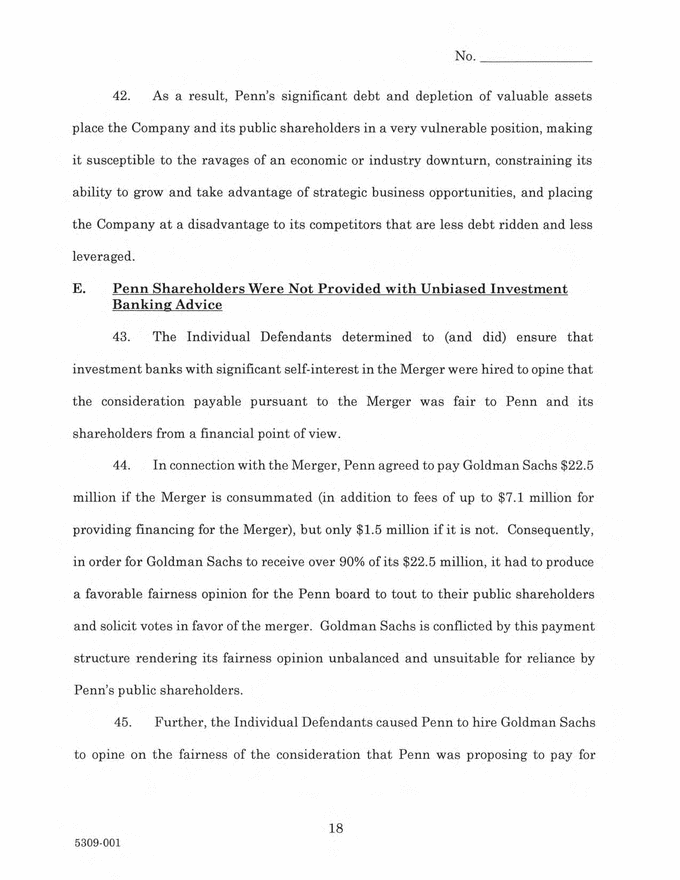
Pinnacle while simultaneously hiring a Goldman Sachs affiliate to loan Penn money to finance the Merger. 46. Upon information and belief, further driving the Individual Defendants' decision to hire Goldman Sachs was the fact that Goldman Sachs was also holding positions in Pinnacle's common stock valued at approximately $10.6 million at the time it issued its fairness opinion (a fact that the Boa1·d caused the Company to misrepresent to Plaintiff and other Penn shareholders), thus giving Goldman Sachs a further incentive to opine that the Merger was fair. Indeed, during the time that it was providing advice to Penn on the Merger Goldman Sachs' and its affiliates more than doubled their holdings in Pinnacle, increasing it by over 130%. 47. Consequently, Goldman Sachs is entitled to receive millions of dollars that it would not otherwise receive had it not opined that the Merger was "fair" and therefore it was unable to render an impartial fairness opinion. F. The Prospectus Misrepresents Goldman Sachs' Conflicts of Interests 48. Additionally, in connection with the Merger Agreement, the members of Penn's Board are breaching their (and are causing Penn to breach its) fiduciary duties of disclosure to Penn's shareholders under Pennsylvania law through the issuance of a materially deficient Prospectus, mailed to Penn shareholders in connection with soliciting votes in support of the Merger. This failure to disclose material information is also an intentional interference with the contractual right of the Company's shareholders to make a fully informed decision on whether to vote in support of the
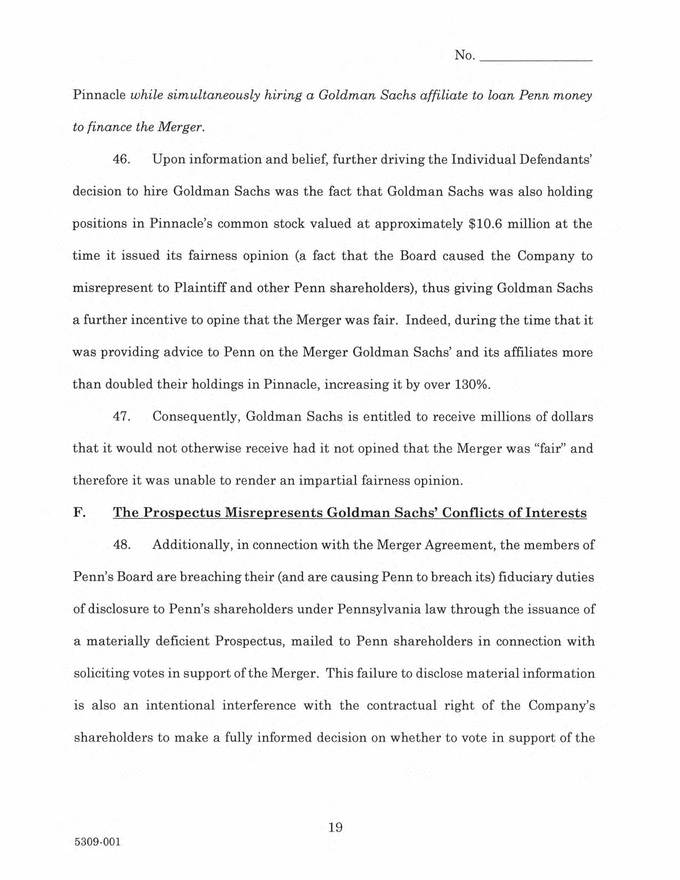
Merger. In this regard, the Prospectus is severely deficient because it fails to disclose the following material information: (a) According to the P1·ospectus, in the ordinary course of business, Goldman Sachs and its affiliates may actively trade or hold the securities of Penn, Pinnacle, and their respective affiliates (or portfolio companies, as applicable) for its own account or for the account of its customers and, accordingly, may at any time hold a long or short position in such securities. The Prospectus is deficient because it fails to disclose that Goldman Sachs and its affiliates do in fact hold positions in Pinnacle's securities and that they had steadily increased then· holdings in Pinnacle since they began advising the Company on the proposed transaction.Indeed, from the time Goldman Sachs began advising Penn on a potential acquisition of Pinnacle, it has increased its holdings in Pinnacle by over 130%. As of December 31, 2017, Goldman Sachs and its affiliates owned over $10.6 million worth of Pinnacle's common stock. Information with regard to any conflicts of interest that the Company's financial advisor may have is material to the public shareholders in determining how much weight to place on its fairness opinion and must therefore be disclosed. This information is particularly material here because the Defendants have misleadingly stated that Goldman Sachs' may have holdings in Pinnacle when Goldman Sachs in fact holds over $10.6 million worth of Pinnacle's common stock. (b) According to the Prospectus, Penn's management discussed with the Board their intention to have Goldman Sachs finance the acquisition of Pinnacle in addition to acting as Penn's financial advisor throughout the transaction. The Prospectus is deficient for failing to disclose the details, circumstances, and reasoning leading up to Penn's selection of Goldman Sachs, who was already providing financial services to Penn in connection with the Merger, to also provide debt fmancing to Penn notwithstanding the significant conflict of interest this foisted upon Goldman Sachs. Information with regard to any conflicts of interest that the Company's financial advisors may have is material to the public shareholders in determining how much weight to place on their fairness opinions and must therefore be disclosed. Here, by
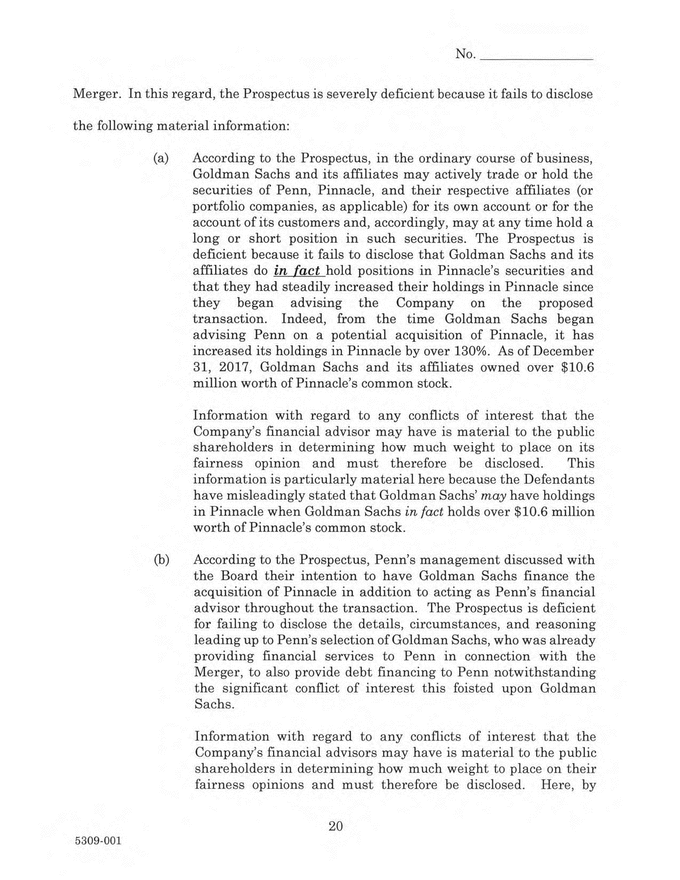
requesting financing from Goldman Sachs, the Defendants have effectively foisted a conflict on Goldman Sachs. In this regard, the higher the price Penn pays for Pinnacle, the greater its need to draw from the financing Goldman Sachs is providing. (c) According to the Prospectus, $2.5 million of Goldman Sachs' transaction fee is payable at the discretion of Penn. The Prospectus is deficient for failing to disclose the factors that Penn will consider when determining to pay the discretionary fee and the circumstances under which this discretionary fee is payable. Information with regard to any conflicts of interest that the Company's financial advisors may have is material to the public shareholders in determining how much weight to place on their fairness opinions and must therefore be disclosed. FIRST CAUSE OF ACTION CLASS CLAIM FOR BREACH OF CONTRACT AND INTENTIONAL INTERFERENCE WITH CONTRACTUAL VOTING RIGHTS (Against the Individual Defendants) 49. Plaintiff repeats and realleges all previous allegations as if set forth in full herein. 50. In acquiring Penn shares, Plaintiff and the other members of the Class acquired a contractual right to have Penn and its directors make full and complete disclosure of material information when they seek shareholder action. This right is found, inter alia, in Penn's Articles of Incorporation and Bylaws, particularly when those documents are interpreted in light of the covenant of good faith and fair dealing implicit in every contract governed by Pennsylvania law.
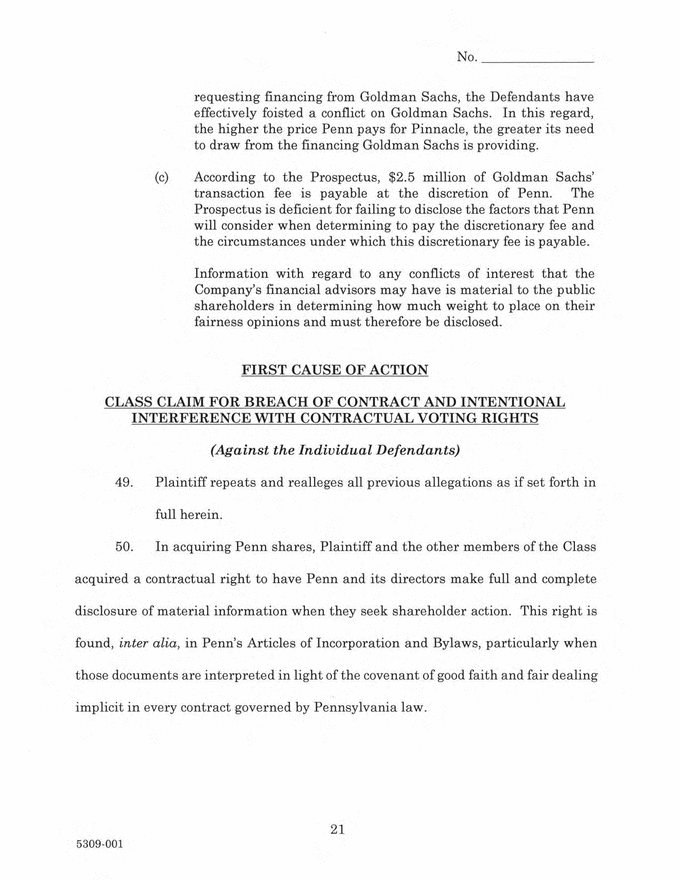
51. By reason of the foregoing allegations, the Individual Defendants have intentionally interfered with that contractual right in the absence of a privilege or justification for such interference. 52. As a result, Plaintiff and the Class have been and will be irreparably harmed. WHEREFORE, Plaintiff demands judgment as follows: (i) determining that this action is properly maintainable as a class action, and that Plaintiff is a proper class representative; (ii) determining that this action is a proper derivative action under Pa. R.C.P. Rule 1506, and that Plaintiff is a proper derivative representative; (iii) declaring that the Defendants intentionally interfered with shareholders' rights, including the contractual rights of shareholders to make informed voting decisions, in the absence of a privilege or justification for such interference; (iv) declaring that Defendants have breached their duties and obligations to Penn; (v) declaring that the Defendants' conduct has resulted in or will result in damages to Penn, Plaintiff and the Class; (vi) enjoining consummation of the Merger Agreement until trial; (vii) awarding Plaintiff and the Class compensatory and/or rescissory damages (in an amount in excess of arbitration limits) as allowed by law; (viii) awarding interest, attorney's fees, expert fees and other costs, in an amount to be determined; and (ix) granting such other relief as the Court may find just and proper.
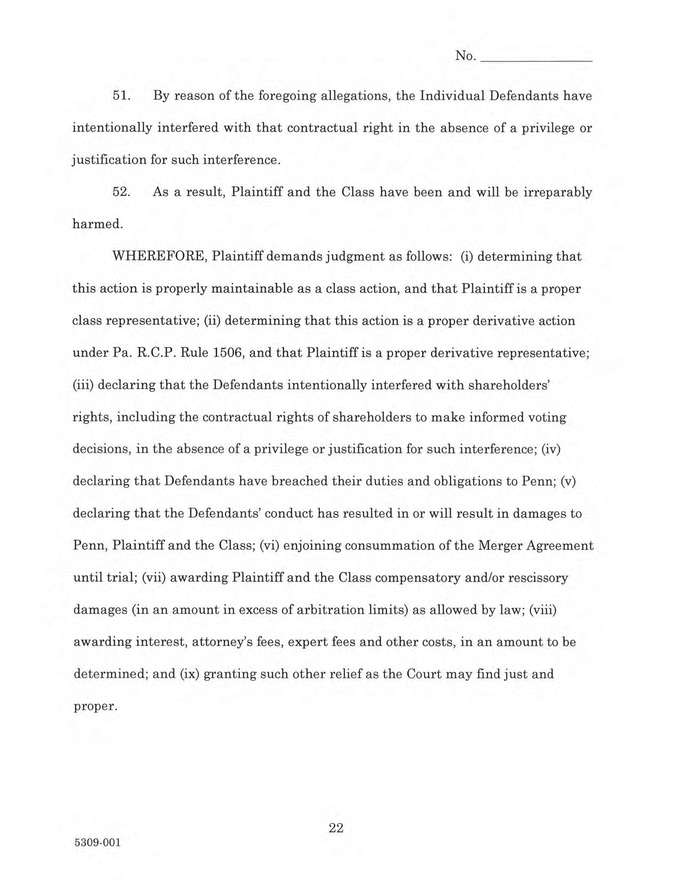
SECOND CAUSE OF ACTION CLASS CLAIM TO ENJOIN THE SALE OF THE COMPANY FOR FUNDAMENTAL UNFAIRNESS UNDER 15 Pa.C.S. § 1105 (Against All Defendants) 52. Plaintiff repeats and realleges all previous allegations as if set forth in full herein. 53. Pursuant to 15 Pa.C.S. § 1105, shareholders in a Pennsylvania corpo1a· tion are entitled to an injunction against a merger if fundamental unfairness is present. 54. In causing Penn to enter into the Merger Agreement, the Individual Defendants allowed their personal interests in receiving substantial cash payments and other personal incentives to prevail over their duties of care, loyalty, and good faith to the Company. As a result, the Individual Defendants caused the Company to agree to overpay for Pinnacle, which resulted in the fundamentally unfair terms of the Merger Agreement. 55. Further, by causing the Company to issue a materially misleading and deficient Prospectus, the Individual Defendants have breached Penn's shareholders rights (and intentionally interfered with Penn's shareholders rights) to make a fully informed vote on the Merger, which is fundamentally unfair. 56. As alleged above, the Merger Agreement is fundamentally unfair to Penn's legitimate shaTeholders with respect to the way the Merger Agreement was negotiated and disclosed to Penn's shareholders and the economic and financial considerations and consequences of consummation of the Merger Agreement. This
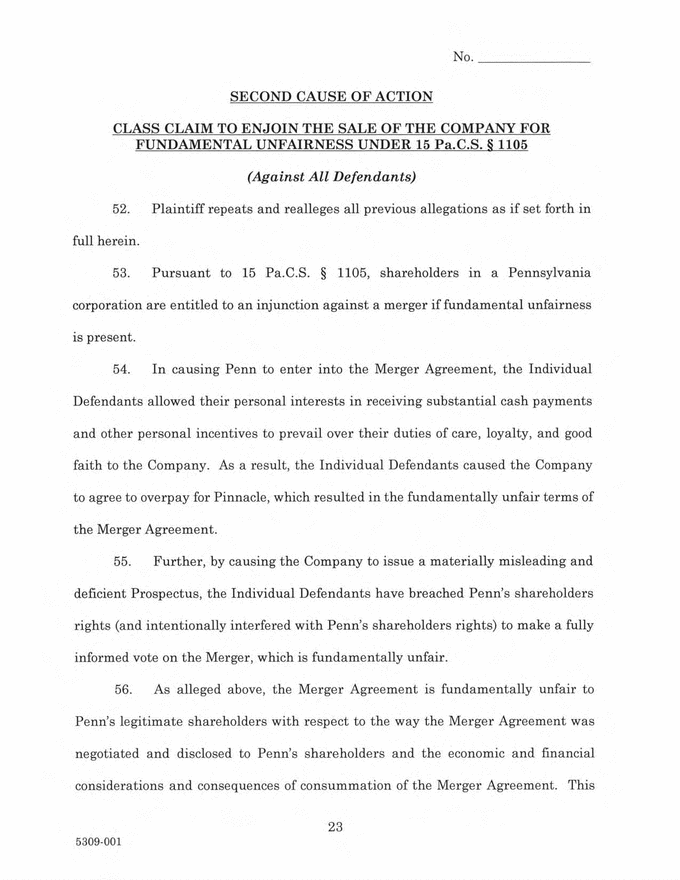
Court therefore has the authority under Pennsylvania state and common law to enjoin the sale of the Company to Penn. WHEREFORE, Plaintiff demands judgment as follows: (i) determining that this action is properly maintainable as a class action, and that Plaintiff is a proper class representative; (ii) determining that this action is a proper derivative action under Pa. R.C.P. Rule 1506, and that Plaintiff is a proper derivative representative; (iii) declaxing that the Defendants intentionally interfered with shareholders' rights, including the contractual rights of shareholders to make informed voting decisions, in the absence of a privilege or justification for such interference; (iv) declaring that Defendants have breached their duties and obligations to Penn; (v) declaring that the Defendants' conduct has resulted in or will result in damages to Penn, Plaintiff and the Class; (vi) enjoining consummation of the Merger Agreement until trial; (vii) awarding Plaintiff and the Class compensatory and/or rescissory damages (in an amount in excess of arbitration limits) as allowed by law; (viii) awarding interest, attorney's fees, expert fees and other costs, in an amount to be determined; and (ix) granting such other relief as the Court may find just and proper. THIRD CAUSE OF ACTION DERIVATIVE CLAIM FOR BREACH OF FIDUCIARY DUTIES (Against the Individual Defendants) 57. Plaintiff repeats and realleges all previous allegations as if set forth in full herein.
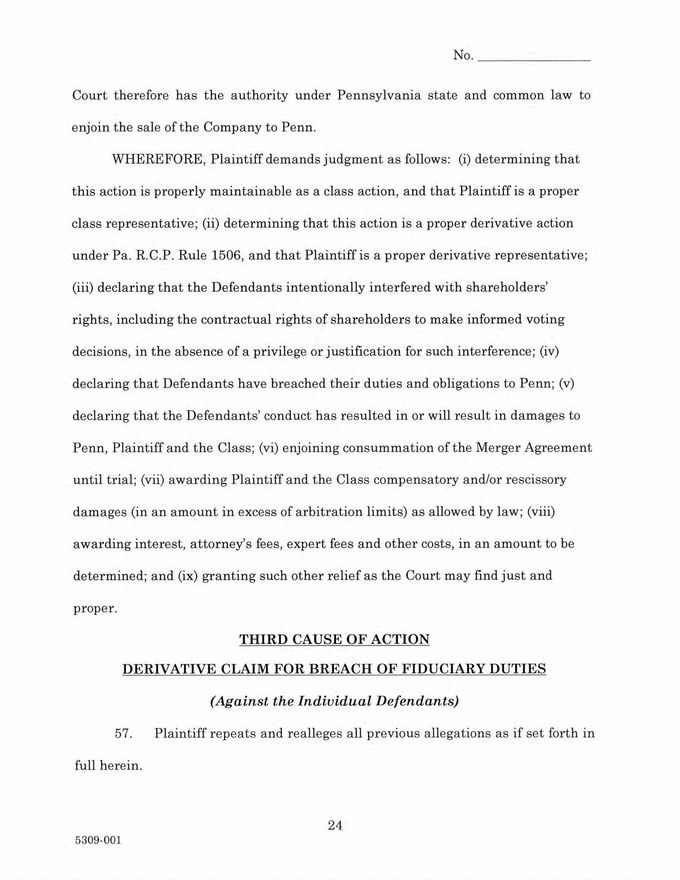
58. By reason of the foregoing, the Individual Defendants have breached their fiduciary duties of, inter alia, good faith, loyalty, fair dealing, and due care to Penn and have acted to put their personal interests ahead of the interests of the Company, rather than making good faith decisions after an adequate investigation. Further, because the Individual Defendants were motivated by their own personal self-interests, 15 Pa.C.S. § 1715(b) is inapplicable. 59. As a result, Penn has and will be harmed. WHEREFORE, Plaintiff demands judgment as follows: (i) determining that this action is properly maintainable as a class action, and that Plaintiff is a proper class representative; (ii) determining that this action is a proper derivative action under Pa. R.C.P. Rule 1506, and that Plaintiff is a proper derivative representative; (iii) declaring that the Defendants intentionally interfered with shareholders' rights, including the contractual rights of shareholders to make informed voting decisions, in the absence of a privilege or justification for such interference; (iv) declaring that Defendants have breached their duties and obligations to Penn; (v) declaring that the Defendants' conduct has resulted in or will result in damages to Penn, Plaintiff and the Class; (vi) enjoining consummation of the Merger Agreement until trial; (vii) awarding Plaintiff and the Class compensatory and/or rescissory damages (in an amount in excess of arbitration limits) as allowed by law; (viii) awarding interest, attorney's fees, expert fees and other costs, in an amount to be determined; and (ix) granting such other relief as the CouTt may find just and proper.
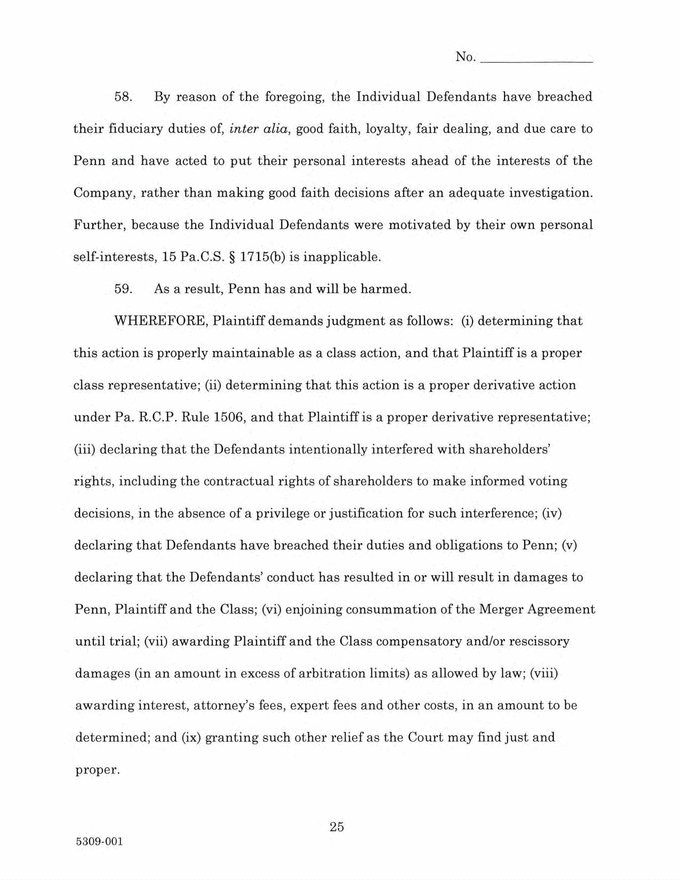
FOURTHCAUSEOFACTION DERIVATIVE CLAIM FOR FAILURE TO DISCLOSE (Against the Individual Defendants) 60. Under applicable law, the Individual Defendants have a fiduciary obligation to cause the Company to disclose all material facts in the Prospectus so that shareholders can make an informed decision as to whether to vote their shares in support of the Merger. As alleged in detail above, the Individual Defendants have breached their fiduciary duty through causing the Company to make materially inadequate disclosures and material omissions - a breach of fiduciary duty caused by the motivations alleged above. 61. As a result of these failm·es to disclose, Penn has and will be irreparably harmed. WHEREFORE, Plaintiff demands judgment as follows: (i) determining that this action is properly maintainable as a class action, and that Plaintiff is a proper class representative; (ii) determining that this action is a proper derivative action under Pa. R.C.P. Rule 1506, and that Plaintiff is a proper derivative representative; (iii) declaring that the Defendants intentionally interfered with shareholders' rights, including the contractual rights of shareholders to make informed voting decisions, in the absence of a privilege or justification for such interference; (iv) declaring that Defendants have breached their duties and obligations to Penn; (v) declaring that the Defendants' conduct has resulted in or will result in damages to Penn, Plaintiff and the Class; (vi) enjoining consummation of the Merger Agreement until trial; (vii) awarding Plaintiff and the Class compensatory and/or rescissory damages (in an
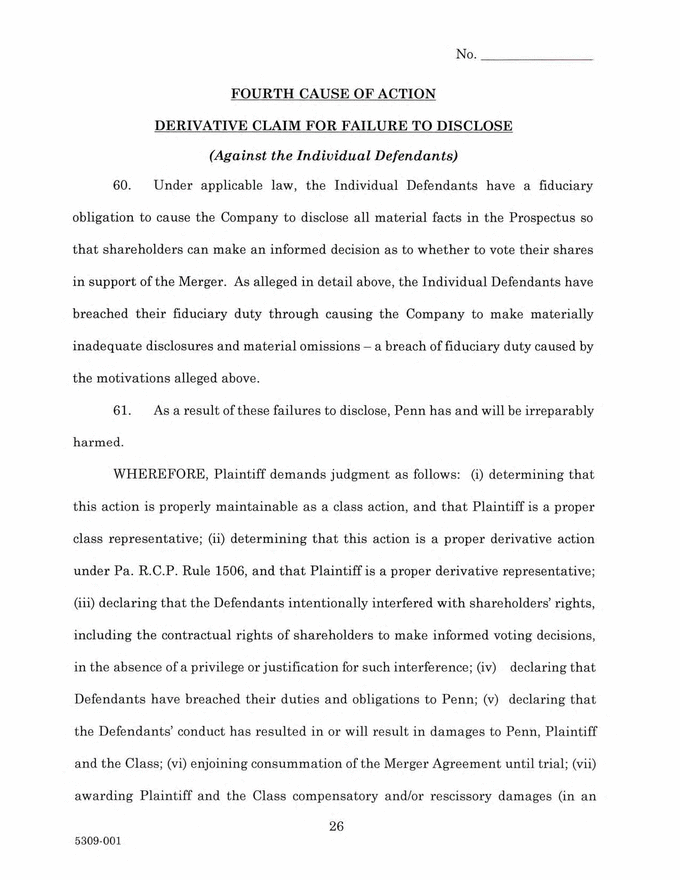
amount in excess of arbitration limits) as allowed by law; (viii) awarding interest, attorney's fees, expert fees and other costs, in an amount to be determined; and (ix) granting such other relief as the Court may find just and proper. FIFTH CAUSE OF ACTION CLASS CLAIM FOR UNJUST E NRICHMENT (Against the Individual De fendant s) 62. Plaintiff repeats and realleges all previous allegations as if set forth in full herein. 63. As demonstrated by the allegations above, the Merger Is the product of self-dealing and misrepresentations by the Individual Defendants amounting to fraud or fundamental unfairness. 64. The Individual Defendants are unjustly enriching themselves at the expense of Plaintiff and the members of the Class and should be required to disgorge their unjust gain. WHEREFORE, Plaintiff demands judgment as follows: (i) determining that this action is properly maintainable as a class action, and that Plaintiff is a proper class representative; (ii) determining that this action is a proper derivative action under Pa. R.C.P. Rule 1506, and that Plaintiff is a proper derivative representative; (iii) declaring that the Defendants intentionally interfered with shareholders' rights, including the contractual rights of shareholders to make informed voting decisions, in the absence of a privilege or justification for such interference; (iv) declaring that Defendants have breached their duties and obligations to Penn; (v) declaring t_hat
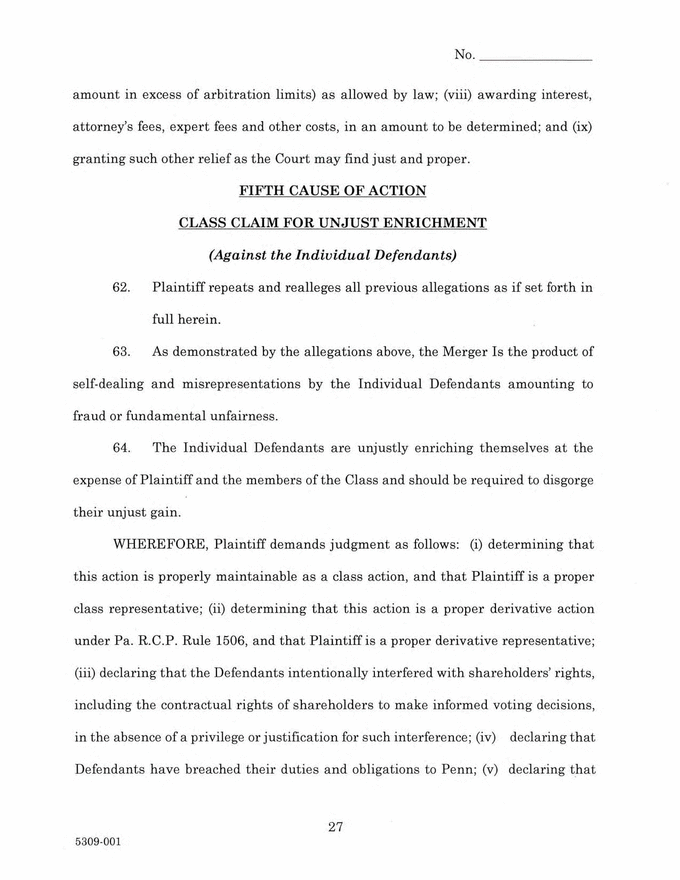
the Defendants' conduct has resulted in or will result in damages to Penn, Plaintiff and the Class; (vi) enjoining consummation of the Merger Agreement until trial; (vii) awarding Plaintiff and the Class compensatory and/or rescissory damages (in an amount in excess of arbitration limits) as allowed by law; (viii) awarding interest, attorney's fees, expert fees and other costs, in an amount to be determined; and (ix) granting such other relief as the Court may find just and proper. JURY TRIAL DEMAND Plaintiff hereby demands a trial by jury on all counts of this Complaint that are so triable. BRUBAKER CONNAUGHTON GOSS & LUCARELLI LLC Date: 3 }CJ / t f By:-----/-/./1 ; A /7/: «=----- ghton, Esqu1re Attorney I.D. No. 78775 Maria A. Cusick, Esquire Attorney I.D. No. 312002 Attorneys for Plaintiff Of Counsel: THE BRUALDI LAW FIRM, P.C. Richard B. Brualdi 29 Broadway, Suite 2400 New York, New York 10006 Telephone: (212) 952-0602 Facsimile: (212) 952-0608
